|
|
|
Sort Order |
|
|
|
Items / Page
|
|
|
|
|
|
|
| Srl | Item |
| 1 |
ID:
168967
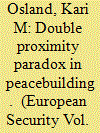

|
|
|
|
|
| Summary/Abstract |
This contribution increases the understanding of the EU's role in post-conflict settings by exploring perceptions of EULEX by local rule of law experts. Drawing on critical peacebuilding and the decline of normative power Europe literatures, we develop an analytical framework, underlining the importance of the intention–implementation gap and the implementation–perception gap in understanding how EU missions are perceived. By comparing local expert narratives to those of EULEX judges, prosecutors, and legal officers, we contend that the core problem for the negative perception of the mission results from what we call the double proximity paradox in peacebuilding. The first paradox is one of implementation and transpires when an actor commits substantial resources to address structural problems in a post-conflict territory due to its centrality for its own interests, but fails to uphold its commitment as its immediate interests can only be achieved through agents who contribute to these problems. The second paradox relates to perception and transpires as high commitments raise expectations of structural impact. The visibility of the actor's investment makes any implementation failures more tangible. The actor is therefore, paradoxically, the most open to criticism in a territory where it is doing the most.
|
|
|
|
|
|
|
|
|
|
|
|
|
|
|
|
| 2 |
ID:
168966
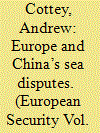

|
|
|
|
|
| Summary/Abstract |
China’s disputes with its South East Asian neighbours and Japan in the South and East China Seas have emerged as important tests of the implications of China’s rise, posing dilemmas not just for regional states but also for other global actors, including European states and the European Union (EU). European responses to these disputes have pulled in three directions: a normative approach emphasising the resolution of disputes within the framework of international law; a power balancing approach, led by France and the United Kingdom, involving support for freedom of navigation operations and strengthened bilateral and EU ties with other Asian states; and de facto acquiescence to Chinese advances in the region. In terms of understanding EU foreign policy, this case suggests a sequence: a normative approach as the initial default EU policy; a turn to power balancing when the effectiveness of that policy is called into question, but also the possibility of acquiescence and consequent divisions amongst EU member states. Europe faces dilemmas in balancing support for the United States, Japan and the South-East Asian states with its strategic partnership with China, but in practice European policy is much closer to that of the former group than that of Beijing.
|
|
|
|
|
|
|
|
|
|
|
|
|
|
|
|
| 3 |
ID:
168963
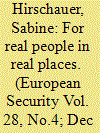

|
|
|
|
|
| Summary/Abstract |
This article builds on most recent scholarship, increasingly critical of the uncritical, or non-critical in critical security studies. Through the empirical context of migration and the theoretical structure of the Copenhagen School, this inquiry draws attention to the hegemonic dominance of securitisation’s negative logic. With Germany as its case study, this article unpacks why and how the securitisation of migration is already always of a distinctly linear, segregating, violent, hence, negative and undesirable security determinism. More simply put: for decades, security and securitisation in critical security studies scholarship remain conflated into the same conditions and practices, reiterating the same meanings, namely: insecurity. By exploring a more inclusive, progressive type of securitisation framing through the subject rather than the referent object locus, this inquiry directs attention to a different kind of what Jef Huysmans initially termed in 2011 “little security nothings.” These other security “nothings,” also so profoundly infused with power, are found embedded in everyday meso-level practices performed and exercised by pro-migration, non-elite, fringe grassroots securitisation actors and audiences such as Germany’s Green Party and many non-governmental organisations (NGOs). This everyday advocacy on-the-ground in Germany animates and sustains inclusive registers of meanings, which make “real people in real places” feel safe and secure.
|
|
|
|
|
|
|
|
|
|
|
|
|
|
|
|
| 4 |
ID:
168965


|
|
|
|
|
| Summary/Abstract |
This article concerns small state security from a cognitive perspective and investigates Estonia as a security actor as perceived by all littoral Baltic Sea states. Drawing on unique elite survey and interview data, the article unpacks similarities and differences among internal (Estonian) and external perceptions of security, threats, and capabilities. The investigation is theoretically informed by research on perceptions, specifically image theory and role theory. Our analysis indicates that there are generally speaking quite similar perceptions among internal and external respondents regarding Estonia’s security situation, threat context, and the importance of EU and NATO membership. When it comes to capabilities in the security field, Estonian respondents have a somewhat more positive view than external respondents. Notably, Russian perceptions stand in stark contrast to those of others regarding most dimensions. Relating our results to previous research on national role conceptions, the perceptions we have explicated correspond to three distinct role conceptions – protectee/faithful ally, sub-system collaborator and regional leader.
|
|
|
|
|
|
|
|
|
|
|
|
|
|
|
|
| 5 |
ID:
168968
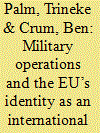

|
|
|
|
|
| Summary/Abstract |
For long, its lack of military means served to single the European Union out as a “civilian” or “normative power”. However, since 2003 twelve EU military operations have been launched. On the basis of a comprehensive analysis of all EU military mission so far, this article seeks to establish how these missions have evolved over time and how they have affected the character of the EU as an international actor. For this purpose, the article outlines four ideal-typical conceptions of the EU's international identity and operationalises them along two underlying dimensions: justification (the purpose of military operations) and policy-embeddedness (the coordination between military means and other foreign policy instruments). Analysing the military operations along these two axes, the article suggests that the EU has been evolving towards a “Liberal Power” identity, as is reflected in a shift from value-based to utility-based justifications, while military operations have at the same time become more embedded in the EU's overall foreign policies.
|
|
|
|
|
|
|
|
|
|
|
|
|
|
|
|
| 6 |
ID:
168964
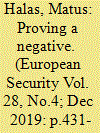

|
|
|
|
|
| Summary/Abstract |
The increased Russian foreign policy assertiveness and the related security concerns associated with the Eastern Flank of NATO caused a revival of interest in European deterrence after more than two decades of neglect. Yet the absence of a military invasion into the Baltics does not necessarily imply a successful deterrent threat. Quite the contrary: a detailed analysis using Boolean logic suggests that deterrence does not really work in the Baltics, neither at the conventional, nor at the sub-conventional level. A lack of capabilities undermines the credibility of NATO’s conventional deterrence posture despite its clear effort to communicate the threat to the other side. The only reason why the lack of capabilities on the Eastern Flank has no negative consequences for the Alliance is because Russia has (currently) no need to advance its state interests by resorting to military force. At the same time, deterrence fails repeatedly at the sub-conventional level and it will probably continue to fail in the future. Incidents like the relocation of the Bronze Soldier Memorial in 2007, the kidnapping of a security officer in 2014 or the violations of airspace in 2018 can escalate to a full-blown crisis. Limiting the number of such incidents should be the main goal of the cumulative deterrence of hybrid threats.
|
|
|
|
|
|
|
|
|
|
|
|
|
|
|
|
| 7 |
ID:
168962


|
|
|
|
|
| Summary/Abstract |
In critical security studies, resilience counts as promoter of a new ontology of crisis insofar as policymakers accept crises as unpredictable and uncontrollable and, eventually, engage in reflexive change of their governance approaches. This paper interrogates the meaning, empirical application and institutional implications of a resilience turn in EU migration governance; a domain where resilience has recently been discovered as potential remedy for dealing with crises, especially so since the on-set of large-scale refugee movements in 2015. The paper offers two contributions: first, we conceptualise resilience as promotive of a new ontology of crisis by wedding existing typologies of resilience to theories of policy change, thus making the notion of resilience-induced ontological change operationalizable for an evaluation of EU migration governance. Second, we analyse three recent EU policy initiatives to illustrate the mileage of our analytical tool. The analysis shows that the EU Commission’s inclination towards reflexive renewal is juxtaposed by the stability-oriented decision-making institutions of the EU and member states. A transformation of policy goals from status-quo preservation through sovereign migration control to flexible policy and institutional change in fluent migration societies seems unviable where EU migration governance remains ontologically torn about migration-related crises and suitable policy responses.
|
|
|
|
|
|
|
|
|
|
|
|
|
|
|
|
|
|
|
|
|